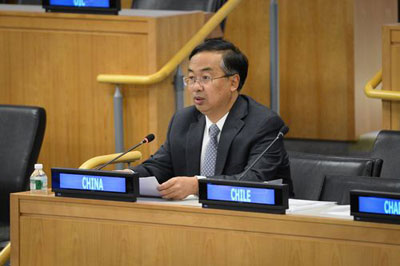| Statement by Ambassador Wang Min, DPR of China to the UN,at the Second Committee of the 69th UN General Assembly on Item 22: Groups of Countries in Special Situations |
| 2014-10-23 06:22 |
|
Mr. Chairman, China associates itself with the statement made by Bolivia on behalf of G77 and China. Mr. Chairman, Against the backdrop of sluggish and uneven global economic recovery, deteriorating humanitarian crises in some conflict areas and the threat to global public safety by the Ebola outbreak, the LDCs and LLDCs, as vulnerable groups of the international community, are faced with ever increasing challenges. The international community should continue to support their development, translate commitments into actions and concretely support the LDCs and LLDCs in their efforts to respond to challenges and resist shocks. Mr. Chairman, ODA is the most direct and effective support for the LDCs and LLDCs as well as their major source of external capital for development. We call on major donors to honor their commitments, give due attention to the LDCs and LLDCs in aid allocation and ensure the even allocation of aid. In the meantime, the international community should actively carry out all sorts of cooperation at the national, regional and global levels, strengthen support in all aspects to the LDCs and LLDCs, and give particular attention to areas of vital importance to their sustainable development such as productivity, infrastructure, transport, agriculture, energy and international trade. Mr. Chairman, The implementation of the Istanbul Programme of Action over the past four years has not been encouraging. The LDCs still faces a herculean task in achieving development. Timely conduct of high-level midterm review will enable comprehensive stock-taking regarding the implementation, thus contributing to the attainment of the goals. China appreciates the mainstreaming of the Istanbul Programme of Action by the UN system and the inclusion of its relevant provisions into the programs of work of various UN bodies. We call on the executive bodies of other UN funds, programs and specialized agencies to follow suit. Positive results have been achieved since the implementation of the Almaty Programme of Action began ten years ago, but the overall economy of LLDCs remains fragile. At the Second UN Conference on LLDCs to be held in Vienna early next month, we will comprehensively review the implementation of the Almaty Programme of Action over the past ten years and map out our support for LLDCs in the coming decade. China hopes that the Vienna Conference will yield anticipated results and calls on parties to push forward consultations on the draft outcome document in an active, flexible and cooperative manner so as to finalize a balanced, pragmatic and win-win document as soon as possible. The UN-OHRLLS is the lead in this area. Its functions and resources should be further enhanced to ensure that the office is fully equipped to monitor and implement the above-mentioned programmes of action. Mr. Chairman, China has been a staunch supporter of the LDCs and LLDCs and has been providing assistance to the best of its ability within the framework of South-South Cooperation by various means and ways. China will continue to give priority to the LDCs and LLDCs in its overseas assistance and will increase its support in view of their needs and work jointly with them in tacking development challenges. The Ebola epidemic has harmed the health and security of the people in the affected areas in West Africa and seriously affected the local economic development and social stability. It is also an urgent threat to the global public health and security. China enjoys profound traditional friendship with fellow developing countries in Africa and is therefore deeply concerned about the damage caused by the Ebola epidemic. As soon as the epidemic broke out at the beginning of this year, my government reacted rapidly by immediately sending humanitarian assistance to the affected areas in three batches worth of 234 million RMB yuan in total. We also dispatched close to 200 experts and medical workers to West Africa to help fight the epidemic. On Oct. 16, the Chinese premier Li Keqiang announced at the ASEM summit the fourth batch of assistance that my government will send to the affected West African countries, which is worth at least 100 million RMB yuan, including ambulances, motorcycles, prevention and control kits and personal protective gears. China will send dozens more experts and plans to train 10,000 local medial workers and community personnel in charge of prevention and control. China is considering another round of assistance, including increasing material assistance in the field of public health to help the African countries concerned enhance their capacity in epidemic prevention and control. China attaches great importance to the UN multilateral trust fund and will make donations to the best of its ability in order to support the UN in leading and coordinating the assistance to Africa for combating the epidemic. We hope that the international community will strengthen coordination and cooperation in a joint effort to fight the Ebola epidemic. The top priority now is to increase material, financial and personnel assistance to the affected areas and guide the local population to have a correct understanding of the epidemic and the ways to combat it, so as to enhance their confidence in beating the epidemic. At the same time, the international community should take a long term perspective and increase assistance to African countries with a view to building their capacity in the field of public health. I thank you, Mr. Chairman. |
| |||||||||||||
| |||||||||||||
